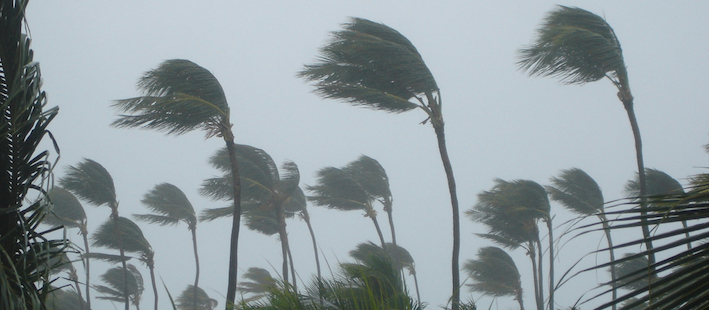
Preparing Your Air Conditioner for Hurricane Season
Hurricane season sucks. If the forecast says there’s a hurricane watch, you keep your eyes peeled for the storm’s route. This is especially true if you live in a flood zone and are trying to figure out whether you need sandbags or whether you should evacuate.
By the time it becomes a warning, there are no longer flashlights, batteries, ice, or bottled water in any single store. This is why it’s best to prepare before hurricane season starts. (For those of you who are new to the area, the season starts on June 1st and goes on until November 30th).
This includes taking care of your AC unit.
How to Prepare Your AC for a Hurricane or Tropical Storm
7 Things to do Before the Storm
1. Shut off the power.
Chances are very high that you’ll lose power during a hurricane. It’s also likely that once the storm passes, power may come on and off several times. These power surges can end up causing a lot of damage not only to your HVAC systems, but also to all of your major appliances. So shut off the thermostat and place the breaker in the off switch. Make sure to keep it that way until things normalize.
Another alternative would be to install a surge arrester to protect your AC unit after the storm.
2. Anchor the condenser unit.
This is the big box that sits outside your home. If your home is relatively new (or if you installed your AC after 2007), it’s likely compliant with the Florida Building Code, which requires air conditioners to be properly anchored in case of a hurricane. If you’re not sure whether yours would withstand strong storms, contact us and let us inspect it for you.
If you have a window unit, remove it and board up the opening. Then store the window unit in a high place inside your home where it isn’t likely to get wet from leaks (cover it with tarps or plastic if possible).
3. Protect the condenser unit.
The same way you wouldn’t leave your car parked outside because of flying projectiles, you should take precautions to protect your air conditioner.
Once you’re sure it’s properly anchored, you can board it up or cover it with tarp. Neither is the sturdiest of coverings, but will keep debris at bay.
4. Elevate your AC. If you live near the coastline, make sure your condenser unit is high enough to stay safe from rising waters. Find out whether your neighborhood is in a flood zone.
5. Bring your patio furniture inside. Even heavy objects like grills, lounge chairs, and tables will go off flying during a hurricane. Reduce the chances of them damaging your condenser unit, windows, or a neighbor’s property by bringing them inside. If you do not have space for everything and you have a swimming pool, leave the pool full and submerge the patio furniture in the water. This will keep them from flying away.
6. Trim your trees. If there are any branches from trees or bushes that are likely to be torn off and cause damage to your air conditioner, cut them off before the storm. It’ll protect your condenser unit and make it easier to clean up debris after the hurricane.
7. Store window awnings. These are yet more likely projectiles that could damage not only your AC condenser unit, but also windows and sliding doors. In fact, walk all around your home and secure anything that could fly away, including items in a shed.
3 Things to do After the Storm
1. Inspect your condenser unit. If any projectiles hit your AC, the fins may be bent. Leaves, dirt, and smaller items may be caught in them. Maybe a rodent or bird made its way inside. All of these things would restrict airflow, causing your unit to work harder, to no avail.
If the fins are bent, you can fix them with a condenser fin comb. To clean your condensate line to remove debris, you can watch this video tutorial.
Also, check to see if the condenser unit smells like something’s burning or if it’s making any hissing sounds, and watch for any lose wiring around it. Do not touch anything that’s out of place. If there’s damage, call the electric company or HVAC professionals for help.
2. If your home had flood damage, wait. Don’t turn on your breakers and appliances once the water is gone. If your condenser unit is low, call an HVAC professional to make sure that it’s ok to turn on your AC. Not doing so may end up inadvertently causing damage to your unit.
3. Pay attention to how long it takes your AC to cool down your home. If it’s taking longer than usual, don’t assume it has to do with the power lines having been recently restored. Your AC may have a refrigerant leak, which in a worst-case scenario, could cause refrigerant poisoning.
Every single year, we have five full months of hurricane season. Don’t wait until everyone’s running around like a headless chicken to look for ways to protect your home. In the words of John F. Kennedy, the best time to fix the roof is when the sun is shining.
Contact A+ Air Conditioning in Gainesville for Air Conditioning Service
Whether you’re looking to protect your home or business, we’re here for you. We also have a 24/7 air conditioner emergency service, so no matter when you need us, we’ll show up.
Contact us and let us protect your AC unit.



